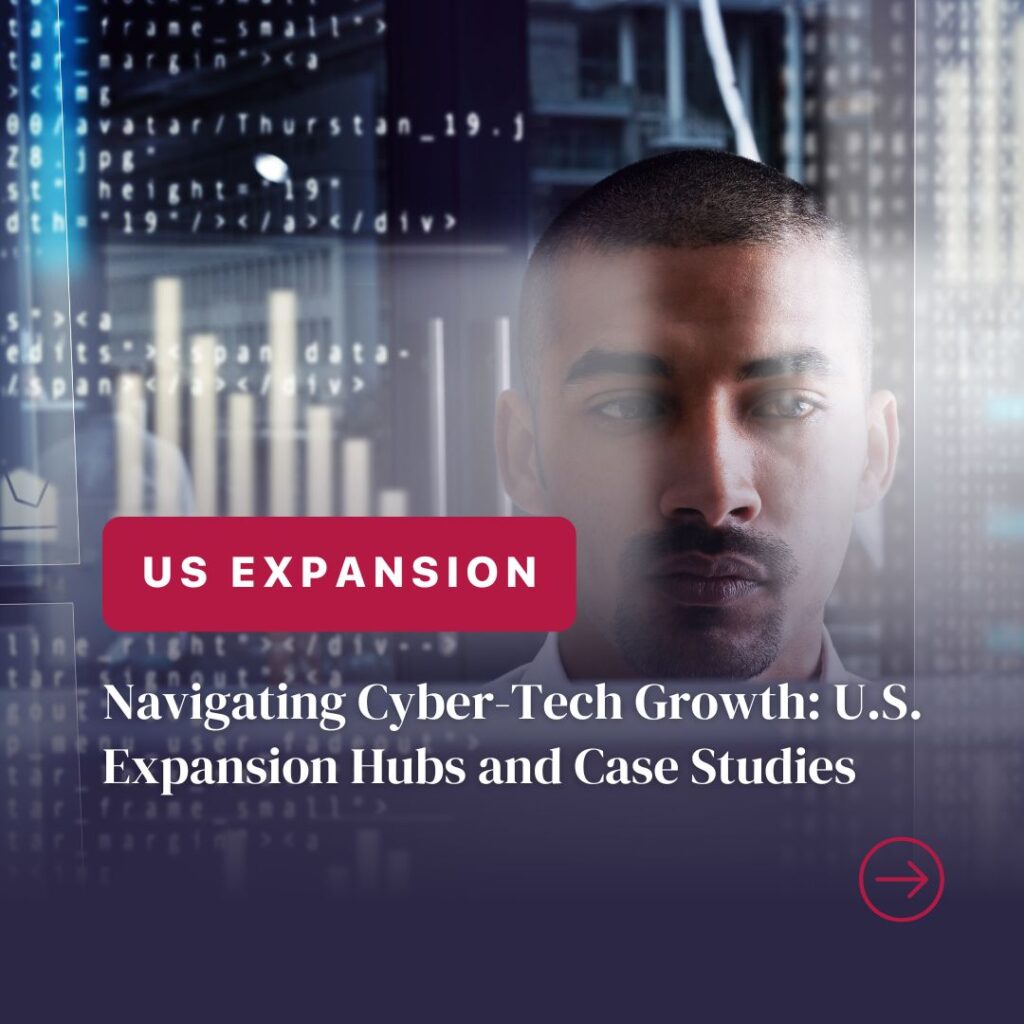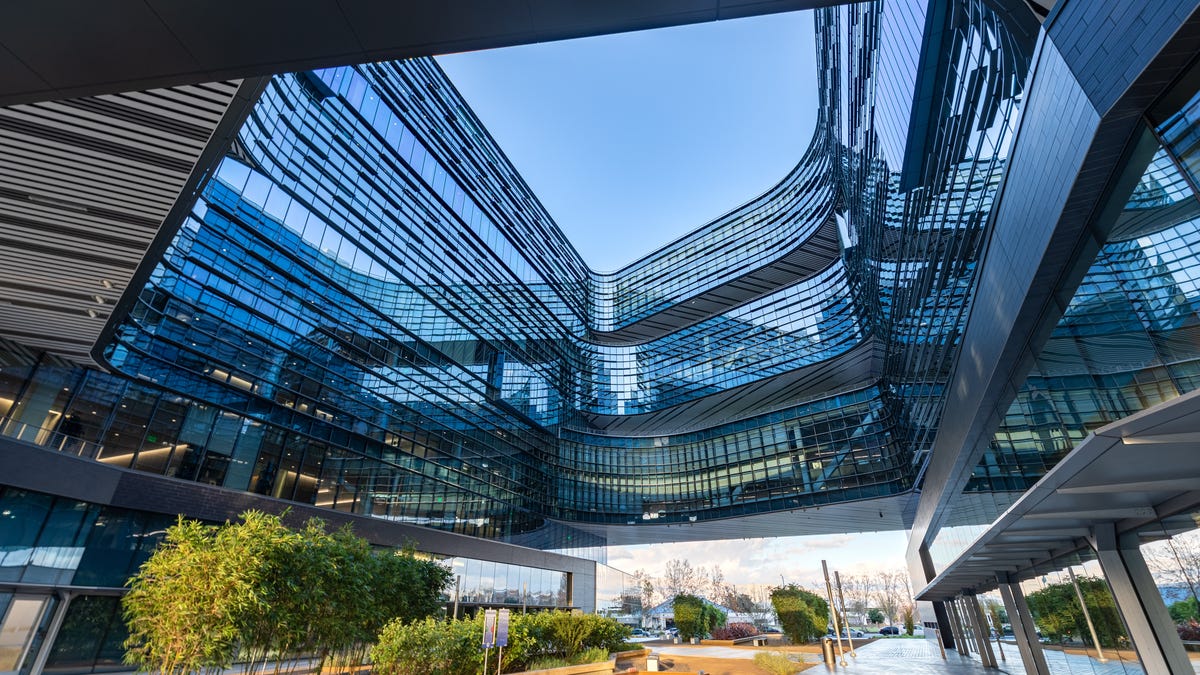U.S. Cyber-Tech Expansion: Top Hubs, Strategies, and Market Insights.
As cyber threats continue to evolve and intensify, international cyber-tech companies are increasingly looking to the United States as a primary market for expansion. The U.S. cyber-tech market presents unique opportunities and challenges, with various cities emerging as specialized hubs for different aspects of cyber technology. This comprehensive guide explores the most promising cyber-tech hubs nationwide, focusing on helping international companies navigate their U.S. expansion journey.
The Cyber-Tech Boom: Setting the Stage
The cyber-tech landscape in the United States has undergone a dramatic transformation, driven by increasing cyber threats, regulatory changes, and the rapid digitalization of businesses across all sectors. Before diving into specific locations, it’s crucial to understand the current state of the cyber-tech industry in the U.S.
- The U.S. cybersecurity market is projected to reach $79.3 billion by 2027, growing at a CAGR of 16.8% from 2023 to 2027 (Research and Markets, 2023)
- International cyber-tech companies raised $2.8 billion in US-based funding rounds in 2023, a 35% increase from 2022 (Cybersecurity Ventures, 2024)
- 75% of Fortune 500 companies implemented at least one international cybersecurity solution in 2023 (Forbes Cyber Report, 2024)
Top 3 Cyber-Tech Hubs in the United States
📍 1. Washington D.C. Metro Area: The Cybersecurity Capital
The D.C. Metro Area, including Northern Virginia and Maryland, has emerged as the nation’s cybersecurity capital, driven by proximity to federal agencies, defense contractors, and a robust talent pipeline.
Why Washington, D.C.?
- Direct access to federal contracts and decision-makers
- Intense concentration of security clearance holders
- Robust ecosystem of defense and intelligence technology
Challenges
- Complex Federal Compliance: Must navigate CMMC 2.0, FedRAMP, NIST 800-171, and evolving zero trust requirements
- Classified Project Management: Difficulty in coordinating between cleared and non-cleared team members
- High Operational Costs: The average cyber security engineer salary is $165,000, 40% higher than the national average
- Intense Competition: Over 300 cyber-tech companies competing for federal contracts in 2024
- Government Procurement Cycles: Long sales cycles (12-18 months) for federal contracts requiring significant capital runway
- International Company Restrictions: Additional scrutiny and limitations for foreign-owned companies working on sensitive projects
Key Statistics
- D.C. metro area cyber-tech companies secured $3.2 billion in federal contracts in 2023 (Federal Procurement Data System, 2024)
- 45% of all U.S. security clearance holders work in the region (ClearanceJobs.com, 2024)
- The area hosts over 1,000 cybersecurity companies, with 30% being international firms (Northern Virginia Technology Council, 2024)
Talent Pool and Qualifications
Security-Cleared Engineers
- 65% hold TS/SCI clearance
- 80% have CompTIA Security+ certification
- Essential skills: FedRAMP compliance, NIST framework implementation
- Average experience: 8+ years in federal cybersecurity
Threat Intelligence Analysts:
- 40% former federal agency employees (FBI, NSA, DHS)
- Required certifications: CISSP, SANS GIAC
- Specialized skills: Federal threat intelligence frameworks, classified data handling
- Common background: Military or intelligence community experience
Compliance Specialists:
- 90% hold multiple certifications (CISM, CRISC, CAP)
- Expertise in DFARS, CMMC 2.0, and FedRAMP
- Average 5+ years experience with federal compliance frameworks
- Strong understanding of ITAR and export control regulations
International Company Success Stories
Darktrace (UK): Established its U.S. federal sector headquarters in Northern Virginia in 2023. Within one year, it secured contracts with three major federal agencies, growing its U.S. revenue by 200%. Darktrace expanded its cleared workforce from 5 to 50 employees by 2024.
Wazuh (Spain): Opened its U.S. operations in Maryland’s Cyber Corridor in 2023, focusing on endpoint detection and response solutions. Partnered with local universities to develop specialized threat detection algorithms, leading to a 150% increase in U.S. enterprise clients.
📍 2. Silicon Valley, California: The AI-Driven Cybersecurity Innovation Hub
Silicon Valley remains at the forefront of technological innovation, particularly in AI-driven cybersecurity solutions. The region’s unique combination of tech talent, venture capital, and innovative culture makes it an attractive destination for cyber-tech companies focusing on cutting-edge solutions.
Why Silicon Valley?
- Unparalleled access to AI and machine learning talent
- Robust venture capital ecosystem focused on cybersecurity
- Proximity to major tech companies and potential clients
- A strong culture of innovation and rapid iteration
Challenges
- AI Talent War: Average time-to-hire for senior AI security engineers is 4.5 months
- Retention Issues: The average tenure for cyber security professionals is 1.8 years
- Integration Complexity: Need to support multiple cloud platforms (AWS, Azure, GCP)
- Innovation Pressure: Required to release new features every 6-8 weeks to stay competitive
- California Privacy Laws: Complex compliance with CCPA/CPRA requiring dedicated legal resources
- Remote Work Expectations: 70% of candidates expect hybrid or remote options
- Competitive Product Landscape: Average of 5-7 direct competitors for each cyber solution
Key Statistics
- Silicon Valley cyber-tech startups raised $4.2 billion in 2023, representing 40% of all U.S. cyber-tech funding (PitchBook, 2024)
- 35% of global AI-driven cybersecurity patents in 2023 originated from Silicon Valley companies (U.S. Patent Office, 2024)
- The region saw a 45% increase in cyber-tech job openings in 2023 compared to 2022 (Silicon Valley Business Journal, 2024)
Talent Pool and Qualifications
AI/ML Security Engineers:
- 75% hold advanced degrees in Computer Science or AI.
- Key skills: TensorFlow Security, PyTorch, Adversarial ML
- Required experience: Cloud-native security architectures
- Standard certifications: CISSP-ISSAP, Cloud Security Alliance certificates
Cloud Security Architects:
- Multi-cloud expertise (AWS Solutions Architect, Azure Security Engineer)
- Container security experience (Kubernetes, Docker)
- Zero Trust implementation experience
- Average 10+ years in cloud-native security
Quantum Computing Security Specialists:
- 30% hold PhD’s in Quantum Computing or related fields
- Experience with post-quantum cryptography
- Research background in quantum-resistant algorithms
- Specialized skills: Quantum key distribution, quantum random number generation
International Company Success Stories
CyberArk (Israel): Established its AI research center in Palo Alto in 2023, focusing on developing autonomous security solutions. CyberArk grew its local team from 15 to 35 engineers within a year. The company launched three new AI-powered products in 2024, leading to a 180% increase in enterprise customers.
Snyk (UK): Expanded its developer security operations to San Jose in 2023, leveraging the local talent pool to build their next-generation container security platform. Within 12 months, Snyk doubled its U.S. revenue and established partnerships with five major Silicon Valley tech companies.
📍 3. Austin, Texas: The Emerging Cyber Innovation Center
Austin has rapidly emerged as a significant cyber-tech hub, offering a unique blend of technical talent, affordable living costs, and a business-friendly environment. The city’s growing technology ecosystem and strong university partnerships make it particularly attractive for international cyber-tech companies.
Why Austin?
- Lower operational costs compared to coastal tech hubs
- A growing pool of cybersecurity talent
- Strong university partnerships for R&D
- Business-friendly regulatory environment
- Robust tech ecosystem with major company relocations
Challenges
- Emerging Ecosystem: Limited number of specialized cyber security service providers
- Rapid Cost Increases: 25% year-over-year increase in office space costs
- Talent Migration: High relocation costs for specialized roles
- Infrastructure Gaps: Limited local SOC 2 auditors and compliance consultants
- Growing Competition: 40% increase in cyber-tech companies since 2023
- Market Education: Need to educate local businesses on advanced cyber threats
- Local Regulations: Texas data breach notification laws and compliance requirements
- Connectivity: Limited direct international flights affecting global team collaboration
Key Statistics
- Austin cyber-tech companies raised $1.8 billion in 2023, a 65% increase from 2022 (Austin Chamber of Commerce, 2024)
- The city added 5,000 new cybersecurity jobs in 2023 (Texas Workforce Commission, 2024)
- 28% of Austin’s tech workforce now specializes in cybersecurity (Austin Technology Council, 2024)
Talent Pool and Qualifications
Security Software Engineers
- 60% from UT Austin and Texas A&M cybersecurity programs
- Full-stack security development experience
- Expertise in secure coding practices and DevSecOps
- Required certifications: CSSLP, Security+
Threat Hunters
- Experience with MITRE ATT&CK framework
- Proficiency in threat-hunting platforms (Splunk, ELK)
- Incident response certification (GCIH, GCFA)
- Background in malware analysis and reverse engineering
Cloud Security Engineers
- Multi-cloud security architecture experience
- Container and Kubernetes security expertise
- Zero Trust implementation experience
- Required certifications: CCSP, AWS Security Specialty
International Company Success Stories
Trend Micro (Japan): Relocated its Americas headquarters to Austin in 2023. Within the first year, the company hired 100 local employees and established a threat research center in collaboration with the University of Texas. By 2024, Trend Micro reported a 120% increase in U.S. market share for cloud security solutions.
WithSecure (Finland): Established its U.S. operations in Austin in 2023, focusing on managed detection and response services. The company leveraged Austin’s lower operational costs to build a 24/7 security operations center, growing from 10 to 80 employees within 18 months and achieving a 200% increase in U.S. revenue.
Emerging Cyber-Tech Hubs in 2024
The cybersecurity landscape constantly evolves, and several cities are rapidly gaining recognition as emerging centers for cyber-tech innovation. These locations offer unique advantages for international companies looking to establish a U.S. presence while avoiding traditional tech hubs’ high costs and intense competition.
📍 1. Salt Lake City, Utah: The Zero Trust Security Hub
Salt Lake City has emerged as a significant player in the cyber-tech space, particularly in zero-trust architecture and cloud security solutions. The city’s combination of technical talent, quality of life, and growing venture capital presence makes it an attractive alternative to traditional tech hubs.
Critical Developments in Salt Lake City
- Cyber-tech companies in Salt Lake City raised $850 million in 2023, a 75% increase from 2022 (Utah Technology Council, 2024)
- The region added 2,500 cybersecurity jobs in 2023 (Utah Department of Workforce Services, 2024)
- 40% of local cyber-tech startups focus on zero-trust solutions (Silicon Slopes Tech Summit, 2024)
- The University of Utah’s Cybersecurity Program saw a 50% increase in enrollment in 2023
International Company Success Stories
Sophos (UK): Established its zero trust development center in Salt Lake City in 2023. Sophos grew from 8 to 45 employees within a year. The company launched two new zero-trust products in 2024, achieving 150% growth in U.S. enterprise customers.
📍 2. Atlanta, Georgia: The Financial Cybersecurity Hub
Atlanta’s position as a significant financial technology center has naturally led to its emergence as a hub for financial cybersecurity innovation. The city’s lower cost of living, diverse talent pool, and strong university partnerships make it particularly attractive for international cyber-tech companies.
Key Developments
- Atlanta cyber-tech companies secured $1.2 billion in funding in 2023 (Metro Atlanta Chamber, 2024)
- The city hosts over 115 financial technology companies requiring cybersecurity solutions
- Georgia Tech’s Cyber Security program graduated 250 specialists in 2023
- 35% increase in cybersecurity job postings from 2022 to 2023 (Atlanta Business Chronicle, 2024)
International Company Success Stories
F-Secure (Finland): Launched its financial security operations center in Atlanta in 2023, leveraging the city’s fintech ecosystem. Within 18 months, F-Secure partnered with 20 regional banks and expanded its local team to 60 employees.
Key US Market Segments for Cyber-Tech Solutions
Understanding the significant purchasers’ location is crucial for bootstrapped and venture-backed cyber-tech companies. Here’s an analysis of three key markets:
1. Financial Services Sector
- Concentrated in New York, Charlotte, and Chicago
- Average cybersecurity budget: $25.8 million (2024)
- Key focus: Fraud prevention, zero trust, and compliance
- Purchasing cycle: Q4 heavy with 45% of annual spending
2. Healthcare Sector
- Major hubs in Boston, Nashville, and Minneapolis
- Average cybersecurity budget: $18.2 million (2024)
- Key focus: HIPAA compliance, IoT security, ransomware protection
- Purchasing cycle: Distributed throughout the year
3. Government/Defense Sector
- Centered in the D.C. Metro Area, San Antonio, and Huntsville
- Average contract size: $4.2 million (2024)
- Key focus: Zero trust, supply chain security, threat intelligence
- Purchasing cycle: Aligned with federal fiscal year (Q3/Q4)
Regulatory Considerations and Compliance
The U.S. cybersecurity market has specific regulatory requirements that vary by state and industry. Here’s what international companies need to know:
Federal Regulations (2024)
- CMMC 2.0 compliance for defense contracts
- FedRAMP authorization for federal agency sales
- NIST framework alignment
State-Specific Requirements
- California: CCPA/CPRA compliance
- New York: SHIELD Act Compliance
- Virginia: CDPA compliance
Market Entry Solutions for International Cyber-Tech Companies
Entering the US cybersecurity market requires strategic planning, deep industry knowledge, and expert guidance. Foothold America offers comprehensive market entry solutions specifically designed for international cyber-tech companies, ensuring a smooth and successful expansion into the US market.
Employer of Record (EOR): Your Fast Track to US Market Entry
For cyber-tech companies wanting to test the US market or hire quickly, our EOR service provides an immediate solution without the complexity of entity establishment. As your legal employer of record, we handle all employment responsibilities while you maintain full operational control of your team. Within one week, you can have your security experts, threat analysts, or compliance specialists working in any US state. Foothold America’s EOR service includes comprehensive employment benefits that help attract top cyber-tech talent, including competitive health insurance, retirement plans, and industry-specific packages. We handle all payroll processing, tax deductions, and benefits administration while ensuring compliance with federal, state, and local regulations. This allows you to focus on your core security solutions while we manage the complexity of US employment.
Read more: Employer of Record Service
Professional Employer Organization (PEO+): Scaling Your US Operations
For cyber-tech companies ready to establish their own entity or those already operating in the US, our PEO+ service goes beyond traditional PEO offerings. We understand that international cyber-tech companies face unique challenges in the US market, from complex compliance requirements to specialized talent needs. Our PEO+ service includes everything standard PEOs offer, plus the crucial cross-border support international companies need. We provide dedicated HR managers in your time zone who understand both your home country’s business culture and US employment requirements. This proves invaluable when managing distributed security teams or coordinating between international R&D centers and US-based operations. The service includes ongoing compliance monitoring, benefits administration, and HR support specifically tailored to cyber-tech companies. Our team stays current with evolving security industry standards and employment regulations, ensuring your company maintains compliance while scaling operations.
Read more: PEO+ Service
US Talent Acquisition: Accessing Critical Cyber Expertise
Finding the right talent is perhaps the most crucial challenge for cyber-tech companies entering the US market. Our talent acquisition service specializes in recruiting hard-to-find security experts, from security-cleared professionals to threat intelligence analysts and zero trust architects. Understanding the unique landscape of US cybersecurity talent, we navigate the complexities of security clearance requirements, industry-specific certifications, and regional salary expectations. Our deep network spans key cyber hubs like Washington D.C., Silicon Valley, and emerging markets like Salt Lake City, enabling us to identify and secure talent that matches both technical requirements and company culture.
Read more: Exclusive Talent Acquisition Service
Conclusion: Building a Sustainable U.S. Presence
The U.S. cybersecurity market, projected to reach $79.3 billion by 2027, offers exceptional opportunities for international companies. Each location presents unique advantages for different cyber-tech specializations, from Washington D.C.’s federal ecosystem to Silicon Valley’s AI innovation hub and emerging centers like Salt Lake City and Atlanta.
However, success in the U.S. cyber-tech market demands more than just selecting the right location – it requires strategic planning, compliance expertise, and access to specialized talent. This is where Foothold America steps in as your essential partner. Whether you’re entering the market through our EOR service, scaling with PEO+, or building your team through our talent acquisition expertise, we provide the foundation needed to establish and grow your U.S. presence while navigating complex regulations and business practices.
Contact Foothold America today to begin your U.S. expansion journey with a partner who understands the unique challenges and opportunities in the cyber-tech sector.
RESOURCES
FAQ’s
Get answers to all your questions and take the first step towards a US business expansion.
The cyber-tech expansion in the USA is driven by several critical factors. The escalating cyber threats, rapid digital transformation across industries, and projected market growth to $79.3 billion by 2027 are primary catalysts. With international cyber-tech companies raising $2.8 billion in US-based funding rounds in 2023, the market demonstrates tremendous potential for global expansion and investment.
The United States leads global cyber-tech expansion through its unparalleled ecosystem of innovation, robust venture capital infrastructure, and key global markets. Unlike many regions, the US offers a unique combination of federal contracts, specialized talent pools in hubs like Washington D.C. and Silicon Valley, and a thriving community of technology investors including Accel and Insight Partners. The market’s ability to attract global software investors sets it apart from other international technology landscapes.
Cyber-tech companies face multiple challenges during U.S. market entry:
- Complex regulatory compliance across federal and state levels
- High operational costs, especially in major tech hubs
- Intense talent competition
- Long government procurement cycles
- Stringent security clearance requirements
- Rapid technological innovation pressure
- State-specific data protection laws
The competitive landscape demands continuous product innovation and adaptation to evolving threat environments, making market entry a sophisticated strategic endeavor.
The U.S. government supports cyber-tech expansion through multiple mechanisms:
- Establishing clear cybersecurity frameworks like CMMC 2.0 and FedRAMP
- Creating substantial federal contract opportunities
- Investing in cybersecurity education and research
- Developing partnerships with academic institutions
- Implementing zero-trust security architectures
- Providing grants and incentives for innovative cybersecurity solutions
These initiatives create a supportive ecosystem for cyber-tech companies to develop powerful platforms addressing proactive cyber threat management.
Three primary industries are significantly impacted by cyber-tech expansion:
- Financial Services
- Average cybersecurity budget: $25.8 million
- Focus: Fraud prevention, zero trust, compliance
- Concentrated in New York City, Charlotte, Chicago
- Healthcare
- Average cybersecurity budget: $18.2 million
- Focus: HIPAA compliance, IoT security, ransomware protection
- Major hubs in Boston, Nashville, Minneapolis
- Government/Defense
- Average contract size: $4.2 million
- Focus: Zero trust, supply chain security, threat intelligence
- Centered in D.C. Metro Area, San Antonio, Huntsville
Cyber-tech expansion is transforming the workforce through:
- Specialized cybersecurity degree programs
- Increased demand for advanced certifications
- Emergence of new job roles like AI security engineers
- Growing emphasis on cloud and quantum computing security
- Higher salaries for specialized skills
- Remote and hybrid work models
- Continuous learning and skill adaptation
The workforce is evolving to meet complex threat management needs across extended threat management platforms.
Series B funding has become crucial for cyber-tech companies seeking to scale their operations in the U.S. market. Investors like Accel and Insight Partners are increasingly focusing on global software investors who understand the potential of cyber-tech innovations. These funding rounds typically enable companies to expand their global footprint, develop powerful platforms, and prepare for even larger scale market penetration.
Cyber-tech companies are developing extended threat management strategies that go beyond traditional security measures. By creating XTM suite solutions and leveraging advanced threat environments, organizations can proactively identify and mitigate risks. The Pacific region has become a critical testing ground for innovative approaches to cybersecurity, with companies investing significant resources in short-time threat detection and response mechanisms.
The European Commission has been instrumental in shaping global cyber-tech strategies, promoting greater efficiency and standardization in cybersecurity approaches. International cyber-tech groups are increasingly aligning their product innovation with European regulatory frameworks, creating more robust and compliant security solutions that can be deployed across multiple global markets.
New York City has emerged as a critical hub for cyber-tech innovation, with the New York City Cyber Command playing a pivotal role in shaping local cybersecurity strategies. Companies are leveraging the city’s financial ecosystem to develop cutting-edge security solutions, attract top talent, and secure new funding opportunities in a short amount of time.
A major milestone for cyber-tech companies in North America typically involves:
- Securing a substantial round of funding
- Establishing a thriving community of users
- Developing part of their journey into key global markets
- Creating long-history partnerships with major enterprises
- Achieving significant product innovation
- Expanding their latest expansion strategies
These milestones demonstrate a company’s ability to navigate the complex North American cyber-tech landscape and provide value in increasingly sophisticated threat environments.
Cyber-tech companies are adopting comprehensive strategies to address future global challenges:
- Developing powerful platforms with adaptive threat management
- Investing in research to anticipate potential attackers
- Creating more robust and flexible security architectures
- Expanding their global footprint through strategic partnerships
- Continuously innovating to stay ahead of emerging cyber threats
The goal is to provide greater efficiency and more comprehensive protection against evolving cyber risks.
Want to know more? Let's connect!
Laurie Spicer
UK Based
Over 25 years experience doing business in North American, European, and Asian markets with a primary focus and specialism on the complexity of the US market.






